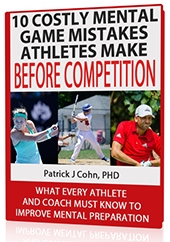
Embracing Sport Psychology in Youth Sports
Many sports parents and coaches want to know how to help athletes accept sports psychology as a means to improve performance.
Parents are unsure about how to introduce young athletes to sports psychology.
Many athletes just do not understand what mental training really is. In our survey, 53% of coaches said athletes shy away from mental training because they don’t understand it!
How do you help young athletes understand the value of mental training?
First, you have to understand why they resist it. Many athletes do not accept it because of the negative stigma associated with psychology.
Do your athletes look at sports psychology as something used by “head cases” only? Do your athletes fear that teammates will harass or tease them for working with a sports psychologist?
One goal has to be educating young athletes about the benefits of sports psychology and helping them get past the old myths that still exist today about working with a mental game coach.
Many athletes still think that sports psychology is only to help athletes crawl out of slumps, for example. However, mental training helps well-functioning athletes perform more consistently too.
This topic is so important that my sister Lisa and I wrote a sports psychology e-book for members at Kids Sports Psychology. The eBook is titled: “Helping Young Athlete Embrace Mental Training.”
To help young athletes accept sports psychology, coaches and parents must communicate the benefits.
They must understand that mental training is not a last resort for struggling athletes or helping athletes who are head cases.
Mental training helps athletes improve their game be learning how to focus better under competition stress.
Athletes who are considered mentally tough improve their performance and mindset. Help your athletes understand some of the common challenges that may indicate they could benefit from sports psychology.
Do they perform like stars in practice, but choke during games?
Do they worry too much about disappointing teammates or parents? Do they want to hide after a loss? If so, sports psychology can help them get better.
Another option is to point out professional athletes or role models that use sports psychology to improve their performance.
Andy Murray, for example, recently admitted to using a sports psychologist to improve his performance in majors! His coach Ivan Lendl suggested he work with a sports psychologist and it paid off in 2012 when he won his first major.
Young athletes do resist what they do not understand.
You want athletes to understand the benefit of sports psychology and mental training, not adopt the myths.
You also want to remove the negative stigma associated with working on the mental game.
I suggest you call it mental toughness training, not sports psychology as mental toughness training is easier for athletes to accept.
In addition, seek out teammates, older athletes, or professional role models you know as examples of athletes who are benefiting from using sports psychology to improve performance.
Often, when athletes see that it can help their peers, they are more likely to try it for themselves.
If you have young athletes who compete in sports, consider a membership to Kids’ Sports Psychology.
Related Sports Psychology Articles:
- What Does it Mean to Be a Team Player?
- Letting Go of Mistakes in Competition
- Moving Past Missed Opportunities in Competition
Free Mental Toughness Reports

Get instant access to a mental game report to improve your mental toughness. Are you making one or more of these “deadly” mental game mistakes prior to competition? You can improve your mental game with one of our free sports-specific reports below.
with our free mental toughness reports, you’ll:
- Discover if you have positive or negative pregame jitters.
- Identify your pre-competition mental game mistakes.
- Learn the important pregame mental skills to boost your performance and success!
Learn how mental game strategies can boost your mental toughness in sports with Dr. Cohn’s free mental game reports!
Dr. Patrick Cohn is an expert mental performance coach who has helped athletes for over 30 years enhance their performance. Dr. Cohn earned a master’s degree in sports psychology from CSUF and a Ph.D. from the University of Virginia, specializing in Applied Sports Psychology.
